Module 7 Unit 1 We’re still influenced by Confucius’s ideas.(课件)
文档属性
| 名称 | Module 7 Unit 1 We’re still influenced by Confucius’s ideas.(课件) |  | |
| 格式 | zip | ||
| 文件大小 | 1.4MB | ||
| 资源类型 | 教案 | ||
| 版本资源 | 外研版 | ||
| 科目 | 英语 | ||
| 更新时间 | 2017-09-22 14:55:21 | ||
图片预览

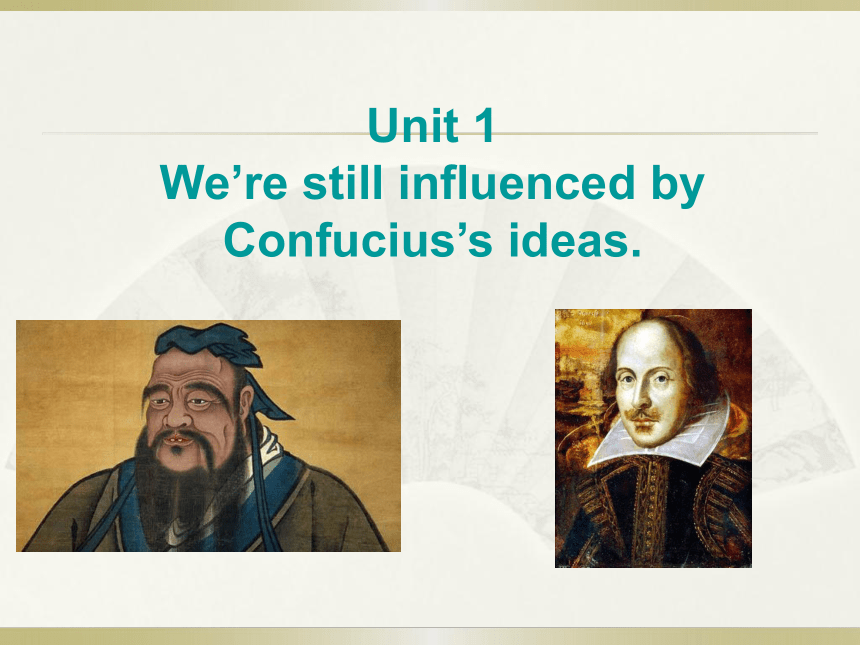
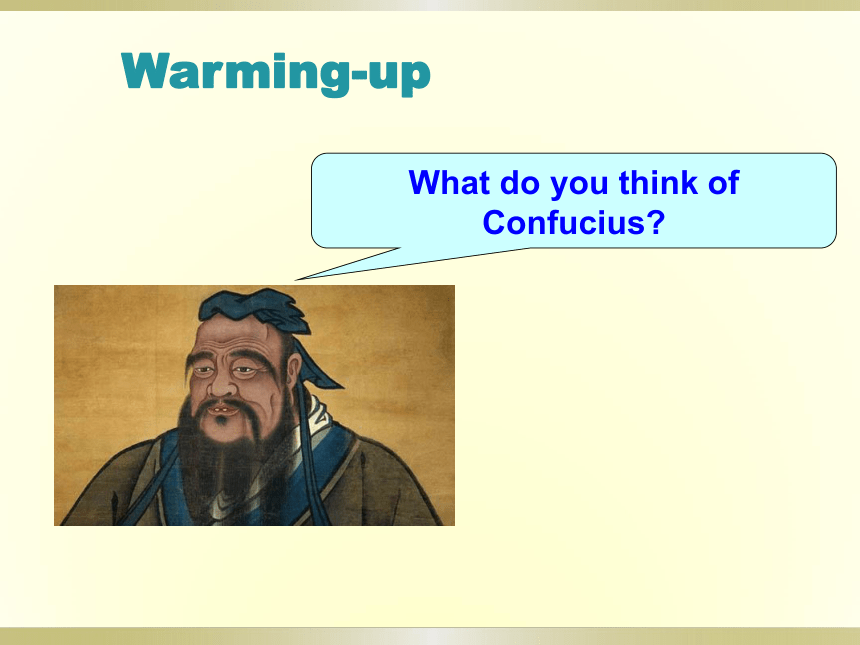

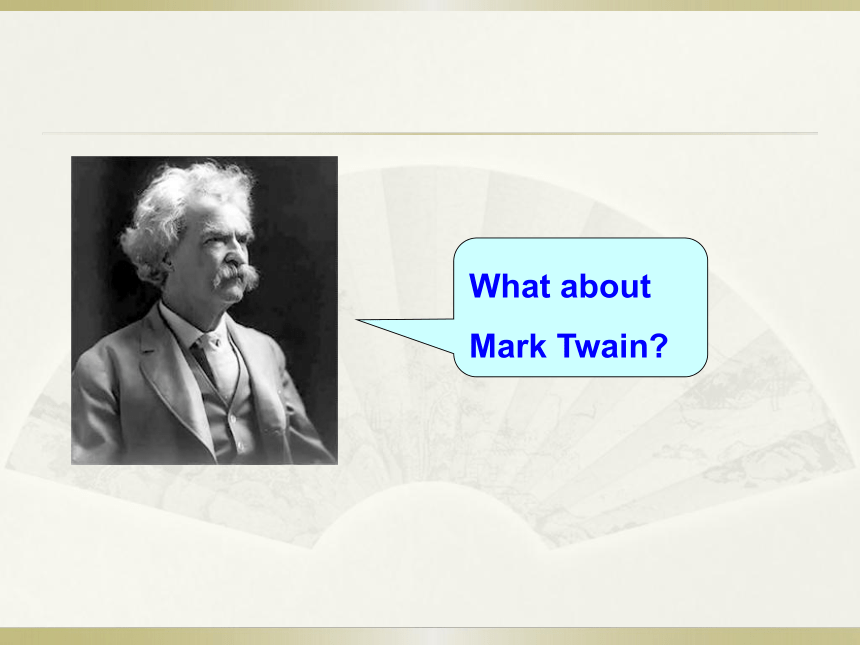
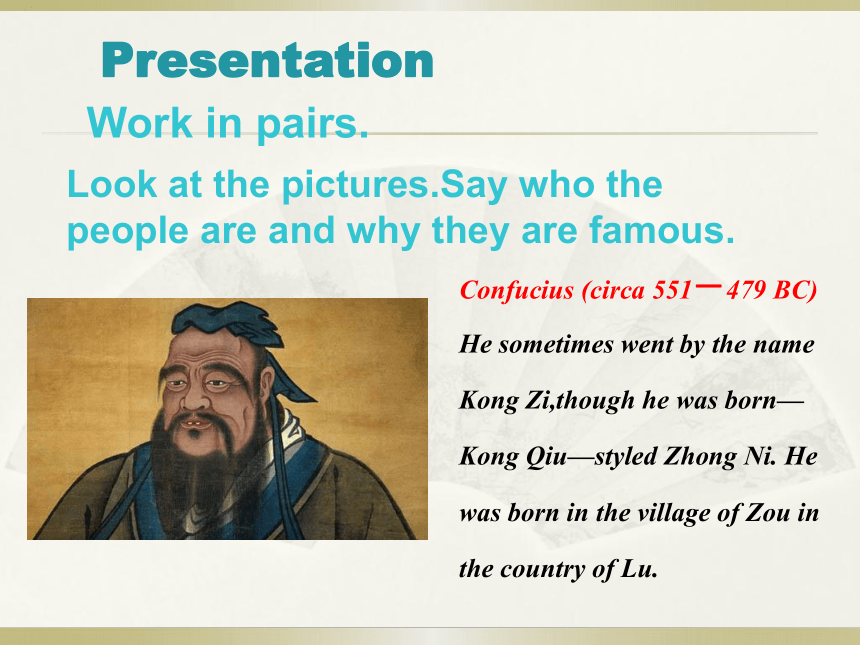
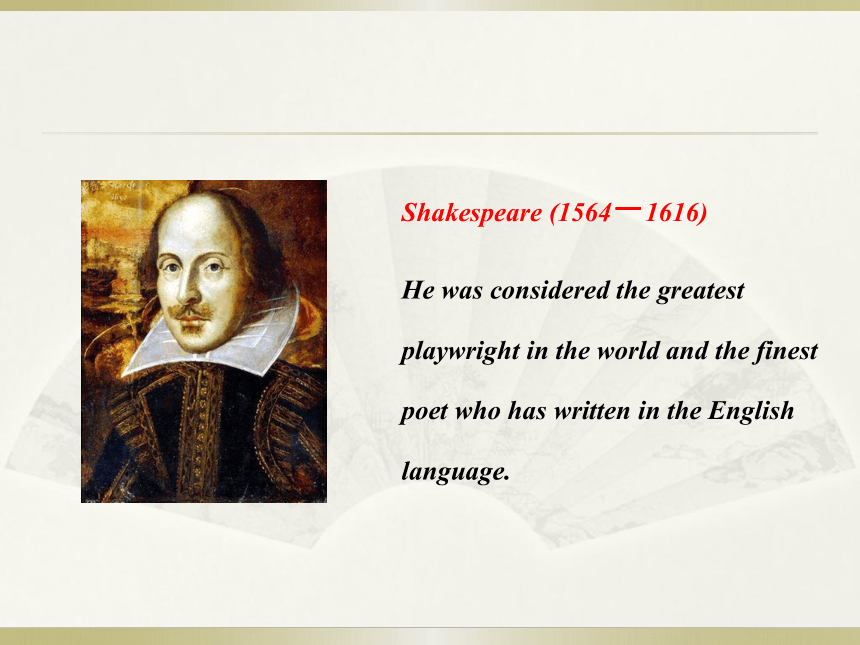

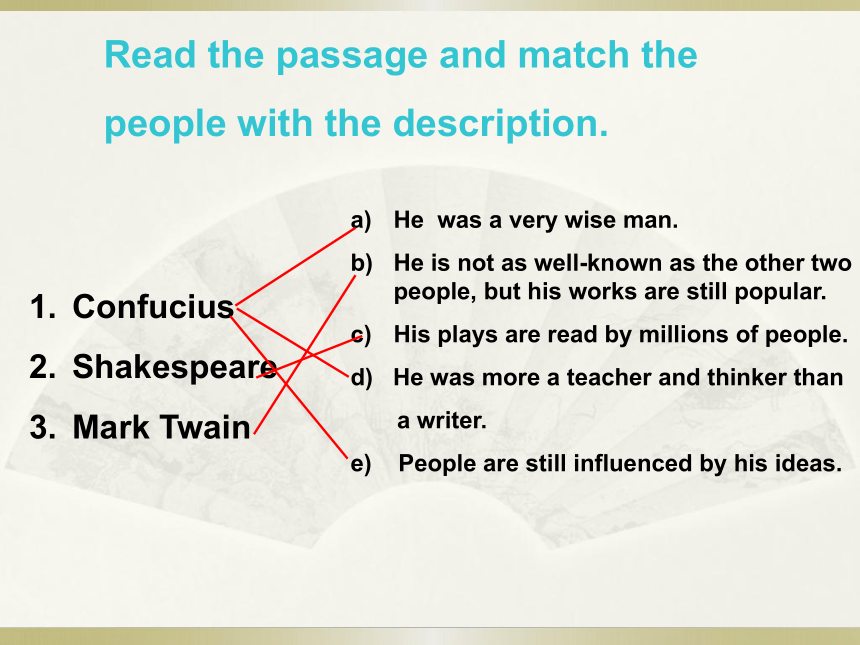
文档简介
课件24张PPT。
Zx.xk Module 7
Great booksUnit 1
We’re still influenced by Confucius’s ideas. What do you think of Confucius?Warming-upWhat do you know about Shakespeare?What about Mark Twain?Confucius (circa 551-479 BC) He sometimes went by the name Kong Zi,though he was born—Kong Qiu—styled Zhong Ni. He was born in the village of Zou in the country of Lu. PresentationWork in pairs.Look at the pictures.Say who the people are and why they are famous.Shakespeare (1564-1616)
He was considered the greatest playwright in the world and the finest poet who has written in the English language. Z.x.x. K Mark Twain ( l835—1910 )
He was the U.S. critical realism literature founder, world renowned short story master. Read the passage and match the people with the description. Confucius
Shakespeare
Mark TwainHe was a very wise man.
He is not as well-known as the other two people, but his works are still popular.
His plays are read by millions of people.
d) He was more a teacher and thinker than
a writer.
e) People are still influenced by his ideas.Language points1. Well,maybe Confucius and Shakespeare.
嗯,可能是孔子和莎士比亚。
(1)maybe,副词,在句中作状语,相当于perhaps,常位于句首。 e.g.Maybe she’ll come this afternoon.
她可能今天下午来。
(2) may,be在maybe中,may是情态动词,be是动词原形,两者构成完整的谓语形式,与主语形成系表结构,意为“也许是;可能是”。 e.g.I can’t find my watch. It may be in your
pocket. 我找不到我的手表了,它可能在你的口袋里。2.Well,each of us reads a favourite book and writes a review for the discussion.
奥,我们每个人读一本最喜爱的书并为讨论写一篇评论。
(1)each作代词,意为“每个,各个”。可单独作主语,也可后接“of+复数名词(或代词)”作主语,其谓语动词用单数形式。若用作同位语,须放在主语的后面,主语用复数形式。
e.g.Each of us has a new book.
他们每个人都有一本新书。
They each want to get the ball.
他们每个人都想得到那个球。辨析:each与every
(1)each用于两者或两者以上中的每 一个,强调个体,可用作副词或代词,可作定语、状语、主语和同位语。
(2)用于三者或三者以上的每一个,强调整体。用作形容词,作定语。e.g.Each of the students has a new bike.
=The students each have a new bike.
=The students have a new bike each.
=Each student has a new bike.
每个学生都有一辆新自行车。
Every student has a new bike.
每个学生都有一辆新自行车。3.He was important ,but I suppose he isn't as well-known as Confucius and Shakespeare.
他很重要,但是我猜想他不如孔子和莎士比亚闻名。suppose v. 猜想;推测;相信;认为
(1)suppose + that 从句,表示“猜测;假定”。 e.g.I suppose that you are right.
我想你是对的。
(2)suppose +名词 / 代词 + to be...,表示“认为……是……”。
e.g.Many people suppose him to be over 50.
许多人认为他已经50多岁了。
(3)suppose用于祈使句中,表示“让……”。 e.g.Suppose we go for a swim.
= Let’s go for a swim.
让我们去游泳吧。
(4)be supposed to... “应该……”;“被期望……”, 后跟动词原形。
e.g.Everyone is supposed to wear a seat-belt in
the car. 每个人在汽车里都应该系安全带。Mr Jackson and Betty are __________ great writers. Betty explains that in her Internet group, each person reads a favourite book and then accept discuss influence review sense thinker wiseComplete the passage with the correct form of the words in the box.discussingExerciseswrites a(n) _______ of it. Mr Jackson ________ that Confucius and Shakespeare are great because their works are still read by people today, but he thinks Confucius was more a teacher and ________ than a writer. He says that Confucius was a very _______ man. Mr Jackson thinks that we are still_________by Confucius’s ideas and that Shakespeare’s plays still make _______ to people today.wiseinfluencedsense学科网 reviewacceptsthinkerDo you agree the following opinions?Give your reasons.1.Teahouse is one of the greatest plays in China.
2. Everyone should learn some Tang poems.
3. We should only read books by great writers.Work in groupsI accept …
I agree / I don’t agree with …
I suppose …
I think …Report the ideas of your group to the whole class.Most of us think...
We think we learn...1.Write your favourite thinker/ writer/
story/play.
2.Search the Internet about “The
Adventures of Tom Sawyer.”Homework
Zx.xk Module 7
Great booksUnit 1
We’re still influenced by Confucius’s ideas. What do you think of Confucius?Warming-upWhat do you know about Shakespeare?What about Mark Twain?Confucius (circa 551-479 BC) He sometimes went by the name Kong Zi,though he was born—Kong Qiu—styled Zhong Ni. He was born in the village of Zou in the country of Lu. PresentationWork in pairs.Look at the pictures.Say who the people are and why they are famous.Shakespeare (1564-1616)
He was considered the greatest playwright in the world and the finest poet who has written in the English language. Z.x.x. K Mark Twain ( l835—1910 )
He was the U.S. critical realism literature founder, world renowned short story master. Read the passage and match the people with the description. Confucius
Shakespeare
Mark TwainHe was a very wise man.
He is not as well-known as the other two people, but his works are still popular.
His plays are read by millions of people.
d) He was more a teacher and thinker than
a writer.
e) People are still influenced by his ideas.Language points1. Well,maybe Confucius and Shakespeare.
嗯,可能是孔子和莎士比亚。
(1)maybe,副词,在句中作状语,相当于perhaps,常位于句首。 e.g.Maybe she’ll come this afternoon.
她可能今天下午来。
(2) may,be在maybe中,may是情态动词,be是动词原形,两者构成完整的谓语形式,与主语形成系表结构,意为“也许是;可能是”。 e.g.I can’t find my watch. It may be in your
pocket. 我找不到我的手表了,它可能在你的口袋里。2.Well,each of us reads a favourite book and writes a review for the discussion.
奥,我们每个人读一本最喜爱的书并为讨论写一篇评论。
(1)each作代词,意为“每个,各个”。可单独作主语,也可后接“of+复数名词(或代词)”作主语,其谓语动词用单数形式。若用作同位语,须放在主语的后面,主语用复数形式。
e.g.Each of us has a new book.
他们每个人都有一本新书。
They each want to get the ball.
他们每个人都想得到那个球。辨析:each与every
(1)each用于两者或两者以上中的每 一个,强调个体,可用作副词或代词,可作定语、状语、主语和同位语。
(2)用于三者或三者以上的每一个,强调整体。用作形容词,作定语。e.g.Each of the students has a new bike.
=The students each have a new bike.
=The students have a new bike each.
=Each student has a new bike.
每个学生都有一辆新自行车。
Every student has a new bike.
每个学生都有一辆新自行车。3.He was important ,but I suppose he isn't as well-known as Confucius and Shakespeare.
他很重要,但是我猜想他不如孔子和莎士比亚闻名。suppose v. 猜想;推测;相信;认为
(1)suppose + that 从句,表示“猜测;假定”。 e.g.I suppose that you are right.
我想你是对的。
(2)suppose +名词 / 代词 + to be...,表示“认为……是……”。
e.g.Many people suppose him to be over 50.
许多人认为他已经50多岁了。
(3)suppose用于祈使句中,表示“让……”。 e.g.Suppose we go for a swim.
= Let’s go for a swim.
让我们去游泳吧。
(4)be supposed to... “应该……”;“被期望……”, 后跟动词原形。
e.g.Everyone is supposed to wear a seat-belt in
the car. 每个人在汽车里都应该系安全带。Mr Jackson and Betty are __________ great writers. Betty explains that in her Internet group, each person reads a favourite book and then accept discuss influence review sense thinker wiseComplete the passage with the correct form of the words in the box.discussingExerciseswrites a(n) _______ of it. Mr Jackson ________ that Confucius and Shakespeare are great because their works are still read by people today, but he thinks Confucius was more a teacher and ________ than a writer. He says that Confucius was a very _______ man. Mr Jackson thinks that we are still_________by Confucius’s ideas and that Shakespeare’s plays still make _______ to people today.wiseinfluencedsense学科网 reviewacceptsthinkerDo you agree the following opinions?Give your reasons.1.Teahouse is one of the greatest plays in China.
2. Everyone should learn some Tang poems.
3. We should only read books by great writers.Work in groupsI accept …
I agree / I don’t agree with …
I suppose …
I think …Report the ideas of your group to the whole class.Most of us think...
We think we learn...1.Write your favourite thinker/ writer/
story/play.
2.Search the Internet about “The
Adventures of Tom Sawyer.”Homework
同课章节目录
- Module 1 Wonders of the world
- Unit 1 It's more than 2,000 years old.
- Unit 2 The Grand Canyon was not just big.
- Unit 3 Language in use
- Module 2 Public holidays
- Unit 1 My family always go somewhere interesting a
- Unit 2 We have celebrated the festival since the f
- Unit 3 Language in use
- Module 3 Heroes
- Unit 1 She trained hard,so she became a great play
- Unit 2There were few doctors, so he had to work ve
- Unit 3 Language in use
- Module 4 Home alone
- Unit 1 I can look after myself, although it won’t
- Unit 2 I became so bored with their orders that I
- Unit 3 Language in use
- Module 5 Museums
- Unit 1 Don't cross that rope!
- Unit 2 If you ever go to London, make sure you vis
- Unit 3 Language in use
- Module 6 Problems
- Unit 1 If I start after dinner, I'll finish it be
- Unit 2 If you tell him the truth now, you will sho
- Unit 3 Language in use
- Revision Module A
- Module 7 Great books
- Unit 1 We're still influenced by Confucius's idea
- Unit 2 It is still read and loved.
- Unit 3 Language in use
- Module 8 Sports life
- Unit 1 Daming wasn't chosen for the team last time
- Unit 2 He was invited to competitions around the w
- Unit 3 Language in use
- Module 9 Great inventions
- Unit 1 Will computers be used more than books in t
- Unit 2 Will books be replaced by the Internet?
- Unit 3 Language in use
- Module 10 Australia
- Unit 1 I have some photos that I took in Australia
- Unit 2 The game that they like most is Australian
- Unit 3 Language in use
- Module 11 Photos
- Unit 1 He's the boy who won the photo competition
- Unit 2 The photo which we liked best was taken by
- Unit 3 Language in use
- Module 12 Save our world
- Unit 1 If everyone starts to do something, the wor
- Unit 2 Repeat these three words daily: reduce, reu
- Unit 3 Language in use
- Revision Module B
